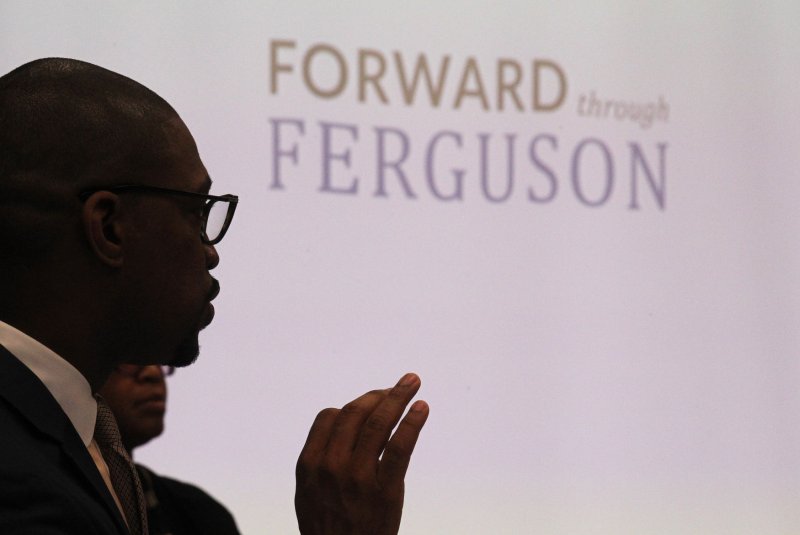1 of 5 | Ferguson Commission co-chair the Rev. Starsky Wilson makes his remarks before delivering the results of the commission's work to Missouri Governor Jay Nixon, during a press conference Monday in Florissant, Mo. The Ferguson Commission was assembled by the governor last November to discuss and recommend changes following the violence and looting that occurred in Ferguson, Missouri following the shooting death of Michael Brown by white Ferguson police officer Darren Wilson. Photo by Bill Greenblatt/UPI |
License Photo
FERGUSON, Mo., Sept. 15 (UPI) -- The Missouri governor-appointed Ferguson Commission called for sweeping changes to address racial inequalities throughout the St. Louis area, concluding race was the driving force behind protests and riots sparked by the police shooting of Michael Brown.
The expansive report, "Forward Through Ferguson: A Path Toward Racial Equity," said to properly address the concerns that surfaced after the August 2014 shooting and subsequent demonstrations, the St. Louis region must recognize the inequities that exist in the criminal justice system, housing, healthcare, education and income.
"We are not pointing fingers and calling individual people racist. We are not even suggesting that institutions or existing systems intend to be racist," the commission wrote. "What we are pointing out is that the data suggests, time and again, that our institutions and existing systems are not equal, and that this has racial repercussions."
Among the key proposals in the blunt assessment of the region, the commission identified many top priorities under four headings: justice for all, youth at the center, opportunity to thrive and racial equality.
Change the criminal justice system in the St. Louis region, including consolidation of police departments in St. Louis County.
Establish civilian oversight boards to meet the needs of each community.
Create a publicly available statewide use-of-force database to track police shootings and other incidents.
Establish the state attorney general as the special prosecutor in all cases of officer-related incidents resulting in injury or death.
Raise the minimum wage to $15 a hour.
Withdraw and cancel all failure-to-appear warrants in courts
Expand access to healthcare programs such as Medicaid and mental health services to inmates.
Notify parents or guardians within four hours when a minor is incarcerated.
Discontinue impounding vehicles for punitive reasons when it is not in the interest of public safety.
Created by the 16-person committee, the report is aimed at taking an "unflinching" look at the community.
"To soften the edges, to try to polish up the rough spots and to just present the stories and statistics that put St. Louis in a positive light, would be a disservice to those citizens who spoke up, and even more so, a disservice to the future of the region," the report said. "If we are to move forward, it's going to happen by confronting our reality, and moving forward through it."
Missouri Gov. Jay Nixon appointed the Ferguson Commission in November 2014 following the shooting death of Brown, an unarmed black 18-year-old, by Darren Wilson, a white police officer. The shooting triggered a nationwide outcry and the growth of the Black Lives Matter movement. Monday, Nixon praised commission members for their "unflinching courage at a moment of reckoning for our state and our nation, for your integrity, and for your dedication to transformational change."
Nixon said some of the suggestions have already been implemented, including hiring more minority police officers, municipal court reforms and a newly implemented review board. He said the commission has been a sounding board that gives the local community a voice.
"The commission created a protected space, a 'kitchen table,' where all members of the community could air their concerns openly. Some experiences that had only been spoken about privately were shared publicly for the first time," he said. "People quickly learned three things -- first, that they were not alone, second, that their voices would be heard, and third, that their concerns would be taken seriously."















